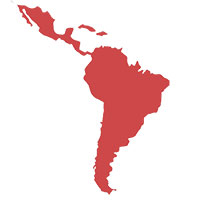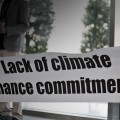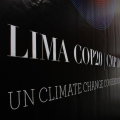Talks Grind On
Hamish M | December 10, 2014.
Dousing hopes for rapid progress on conclusions on the Lima talks, the Africa Group spent the second day of negotiations insisting that language agreed in Durban be introduced into what others felt should be a short preambular text. Africa’s adamant stand early on meant that afternoon talks failed to progress beyond the first of 36 paragraphs up for discussion. This reporter witnessed one of the two co-chairs of the negotiations approach a lead African negotiator during a break in talks and quietly scold him for insisting on certain elements, suggesting that Africa ‘get realistic’ about what they can achieve. The tone was set for a fiery show-down.
As talks resumed, developed countries sought to water down the extent of their obligations to comply with any new treaty that might be produced, arguing since they don’t know what legal form it will take, it is premature to commit to compliance. Anxious poorer nations raised the alarm at attempts by the developed world to avoid meaningful dialogue.
The descent into farce was capped off when Mexico sought to replace the term ‘negotiating text’ with ‘negotiation text’. The usually straight-faced delegations erupted into laughter when, when asked by the Chair, Mexico was unable to explain the difference. The humour, however, was short-lived.
Manoeuvring quickly got under way from the rich states to reduce the scope of any potential agreement in Paris; and minimise their future obligations to finance climate adaptation. In its current form, the Paris protocol will require states not only to reduce emissions, but to transfer technology to developing states, finance investment in renewable energy, and compensate for climate-related loss and damage.
The US wasted no time in attempting to revert the draft text back to the scope of the Durban Platform which, when agreed upon in 2012, made no mention of loss and damage compensation. Japan proposed deleting the entire paragraph and replacing it simply with a reference to the Durban Platform.
These moves were violently opposed by the least developed countries bloc, represented by Tuvalu, one of most vulnerable countries to sea level rise. The island nation’s chief negotiator stilled the audience when he fumed: “I want to make it perfectly clear that loss and damage must be a fundamental element of the agreement”. Switzerland, ever the peace-maker, was more sombre in its assessment, making a plea for pragmatism. “We might not get agreement on loss and damage today”, they noted, adding “it would be surprising if we did”.
Frustration peaked, however, in debates over national contributions to the climate treaty. In the lead up to Paris, each state is currently required to announce their entire suite of climate policies by May 2015. Some states, unwilling or unable to do so, are trying to remove mention of a firm date.
Canada took the lead in arguing for the May 2015 deadline to be changed to ‘any time before Paris’. Such a move, if passed, could prove fatal for the prospects of Paris. Without enough time to table each national commitment, the Paris protocol will be stillborn. The EU was concerned that pushing back the May deadline, which was agreed upon last year in Warsaw, would look like back-pedalling. The island nations, whose very survival depends on success in Paris, insisted on it. At one point, with nine options on the table for a new date, the chair, in exasperation, castigated the negotiators for the chaotic nature of the negotiations which, usually placid, verged at times on hostility.
The evening saw moderate progress on a long-running sticking point in the negotiations. For the past year, developed nations have been lobbying for their commitments under the Paris protocol to consist only of mitigation obligations, and not extend into adaptation efforts. Developing countries, who will suffer the brunt of early climate change impacts, are banking on adaptation being part of the treaty.
Today saw parties seemingly coming closer together on this question when, following an intervention by Norway, Tuvalu came out with frank statement that pursuing adaptation may not be the most constructive approach. It expressed concern that due to limited capacity Tuvalu and countries like it would be unable to come up with good adaptation plans in the coming months that would then risk being cemented in Paris. Adaptation remains crucial for these countries, and Tuvalu stressed it would need strong assurances that it would get an important place in the Paris agreement – which so far it doesn’t feel it’s getting. The issue has been parked for the moment.
Discussions on differentiated responsibilities when it comes to national contributions however saw countries digging in their heels as China and Brazil both put forward the notion of introducing different information requirements for developing and developed countries. This was opposed by EU, US and Japan who wanted to stick to language agreed to in Warsaw that suggests equal information for all countries; some felt we were moving backwards on this issue. More generally, countries expressed concern that some of the issues being discussed today went beyond the scope of the negotiations for Lima and might prejudge Paris discussions.
The co-chairs have consistently reiterated negotiations should have concluded by Thursday night so they can be presented on Friday morning to the conference plenary. With progress moving at a glacial pace, that deadline appears impossible and the talks will likely extend days beyond the scheduled end of the conference. Then again, glaciers are moving faster these days.
Co-written with Cleo Verkuijl.
UPDATE: December 12, 5pm (Lima, Peru). “Insisting on periphery elements” has been changed to “Insisting on certain elements” because The Verb has since clarified that the discussion in question was tied to the Africa Group’s concerns that language previously agreed in Durban is retained.













comment